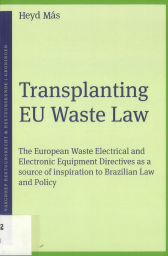
What are the legal instruments and policy choices producing improvements in e-waste management strategies worldwide? Could they be used from one legal system to another? The EU’s tradition of focusing on waste management and setting goals and responsibilities for all stakeholders involved in products life-cycle is remarkable. Its progress in policy and legal instruments on the field throughout the years represent a source of inspiration to other jurisdictions outside the European Union. At the same time, there have been developments in Brazilian law on the topic of waste management through the National Policy on Solid Waste (NPSW), Brazil’s most recent Act, the NPSW is a mark of progress, specifying priority waste streams and demanding well-structured and implemented take-back systems. Nonetheless, there have been considerable difficulties with moving further.
This book studies and analyses the process of drafting and implementing the WEEE Directives in the European member states (MS) with the aim of identifying key policy and legal instruments that have contributed to fully working national WEEE systems. Supported by the Legal Transplants Theory it verifies the possibility for a jurisdiction to inspire others and, points out which lessons could be learned from the European experience that could contribute to the development of the corresponding laws in Brazil.